Upgrade to full Dispatch membership to unlock the full version of this newsletter—and unlimited access to all our reporting and analysis. Join The Dispatch today.
Happy Wednesday! The TSA will now allow flight passengers to keep their shoes on during security screenings. Finally, James can rock his Sperrys sans socks at the airport.
Quick Hits: Today’s Top Stories
- Remotely detonated roadside bombs in the northern Gaza town of Beit Hanoun killed five Israeli soldiers on Monday night, the Israel Defense Forces announced Tuesday. At least 14 troops were wounded in the assault, including two seriously. The mounting military death toll comes amid U.S. efforts to broker a ceasefire and hostage release deal between Israel and Hamas, as President Donald Trump renews his push for a 60-day truce in the Gaza Strip. On Tuesday evening, Trump and Israeli Prime Minister Benjamin Netanyahu met in the White House—their second such meeting in two days—to deliberate on how to close the remaining gaps between Israel and the terrorist group.
- Trump on Monday imposed 25 percent tariffs on imports from Japan and South Korea, and ramped up duties on several other countries, effective August 1. In letters announcing the new rates, Trump warned the affected nations against retaliating, threatening to match any tariff increases on American goods. The leaders of Japan and South Korea, both of whom are currently involved in trade negotiations with the U.S., said that they would continue to seek deals before the August deadline.
- Trump announced Tuesday that the U.S. would provide Ukraine with more weapons, reversing course on a Pentagon decision last week to pause some arms shipments as part of a review of U.S. stockpiles. Trump also indicated Tuesday that he was “very strongly” considering backing a sweeping Russia sanctions bill currently working its way through Congress, as Republican leaders wait for the president’s support before passing the bill. The remarks came amid Moscow’s summer offensive in Ukraine, which has included intensified ground and aerial attacks.
- A federal investigation is underway after an imposter used artificial intelligence technology to mimic Secretary of State Marco Rubio’s voice and writing style, multiple outlets reported Tuesday. According to a cable alerting U.S. diplomatic missions of the incidents, the culprit contacted a U.S. governor, a member of Congress, and multiple foreign ministers “with the goal of gaining access to information or accounts.” The imposter reportedly left voice messages on the Signal messaging app for at least two of the targeted individuals. The U.S. government has not confirmed whether those contacted responded to the messages.
- The number of confirmed deaths from flash floods in central Texas last week rose to 110 on Tuesday, as rescue and recovery efforts continued across the state’s Hill Country. At least 173 people were still missing as of Tuesday, including 161 in Kerr County alone, Texas Gov. Greg Abbott said in a press conference. The Texas National Guard and U.S. Border Patrol’s Border Search, Trauma, and Rescue division have been deployed to aid in search and rescue operations, though the likelihood of finding survivors dims with each passing day.
- The Internal Revenue Service said Monday it would allow religious leaders to endorse political figures from the pulpit, dropping a longstanding rule that conditioned the tax-exempt status of churches and other religious institutions on not engaging in political activity. In a federal court filing, IRS officials wrote that political discussions in churches were like a “family discussion concerning candidates” and did not violate the Johnson Amendment, a 1954 interpretation of tax code banning political activity by tax-exempt religious institutions. The agency’s decision came as the result of a lawsuit brought by an evangelical media group and two churches, which alleged the rule violated the First Amendment.
- The U.S. has set a record for the number of measles cases recorded in a year since the country declared the disease officially eliminated in 2000, according to a Tuesday compilation of public health department data by NBC News. The U.S. has tallied 1,277 cases since the start of 2025, as the virus spreads in Texas, New Mexico, and Kansas. The outbreaks—which have centered around communities with low vaccination rates—pushed the nationwide case count over that of 2019, when the U.S. recorded 1,274 cases.
- The Supreme Court on Tuesday lifted a lower court order blocking mass layoffs of federal workers, allowing the Trump administration to proceed with its extensive restructuring plans for federal agencies. The unsigned order did not rule on the legality of the dismissals, but gave the White House the ability to proceed with them until the court rules on the underlying case. While the exact vote count was not made public, Justice Ketanji Brown Jackson penned a public dissent, calling the ruling “truly unfortunate but also hubristic and senseless.”
‘A Historic Victory’
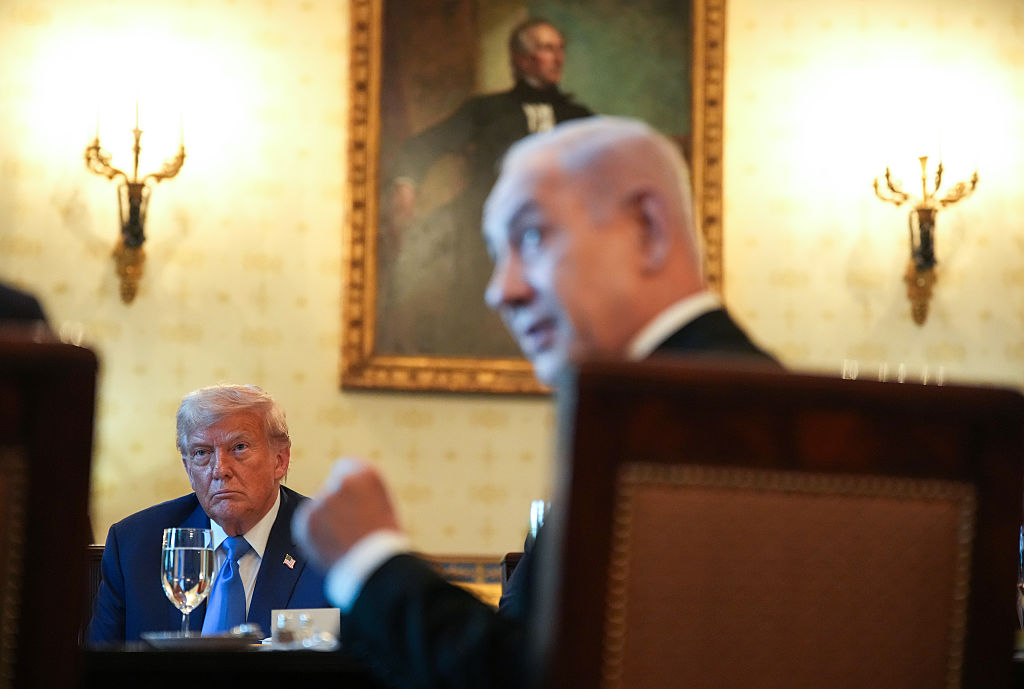
During Prime Minister Benjamin Netanyahu’s first visit to the White House this year, he gifted President Donald Trump a golden pager in honor of Israel’s … explosive … operation against Hezbollah fighters last September. But this week, upon his arrival to Washington for the third time since Trump’s inauguration, Netanyahu gave the American leader something he set his sights on years ago: a nomination for the Nobel Peace Prize.
It’s unclear whether the Israeli premier’s support carries much weight with the Norwegian Nobel Committee, but Trump seemed to appreciate the gesture nevertheless. “Thank you very much,” he told Netanyahu. “Coming from you, in particular, this is very meaningful.”
The moment set the tone for most of Netanyahu’s trip, as the leaders touted their countries’ strikes on Iran’s nuclear program. And more good news could be on the horizon: Both Trump and Netanyahu alluded to possible deals to deepen Israel’s relationship with other countries in the region. But persistent divides over how to end the war in Gaza remain, threatening to unravel some of the momentum gained by Israel’s recent military triumphs.
As a non-paying reader, you are receiving a truncated version of The Morning Dispatch. You can read our full item in the members-only version of TMD.
Meeting twice over the course of two days, the heads of state seemed to get along well—or at least better than one might expect following Trump’s expletive-ridden tirade against Israel late last month, following its alleged violation of a ceasefire with Tehran. During a dinner including Secretary of State Marco Rubio, Defense Secretary Pete Hegseth, and U.S. special envoy to the Middle East Steve Witkoff on Monday, Trump and Netanyahu were largely in sync as they fielded press questions about Gaza, Iran, and the region more broadly.
“This is a historic victory,” the Israeli prime minister said of the bombing campaign in Iran. “This has already changed the face of the Middle East.” But the two leaders seem to diverge on how to approach the Islamic Republic going forward. While Netanyahu warned the country “not to test our fortitude,” Trump voiced optimism that the U.S. military operation—during which American B-2s targeted Iranian nuclear sites at Natanz, Isfahan, and Fordow—was one and done. “They respect us, and they respect Israel,” the president claimed of Tehran, pointing to its heavily telegraphed retaliation against a U.S. military base in Qatar following the American bombing. Witkoff, meanwhile, indicated that U.S. negotiations with Iranian officials over the fate of the country’s nuclear program would happen “very quickly.”
Analysts say one of Israel’s goals will be ensuring that, even as Washington pursues diplomacy with Tehran, the threat of future military action—either by the U.S. or by Israel with American backing—remains. Netanyahu is “concerned about Iran in particular, and making sure that Trump maintains pressure on Iran even post-strikes,” Raphael S. Cohen, the director of the Strategy and Doctrine Program at the Rand Corporation’s Project Air Force, told TMD.
For now, the Islamic Republic itself appears reluctant to return to the negotiating table. On Tuesday, Iran’s foreign ministry spokesman denied the White House’s claim that talks between the two countries were forthcoming. And last week, the country’s top Shiite cleric issued a fatwa, or religious decree, calling on Muslims worldwide to assassinate Trump in response to threats to Supreme Leader Ali Khamenei’s life.
But while an Iran deal may remain elusive, Trump may be on the precipice of securing agreements to build on one of the crowning diplomatic achievements of his first term: the Abraham Accords. The series of normalization treaties between Israel and a number of Arab states—including the United Arab Emirates, Bahrain, and Morocco—could soon expand to include Lebanon and Syria, both former adversaries of Jerusalem. “We have already transformed the Middle East beyond recognition, and we now have a chance to bring a great future to the state of Israel, the people of Israel, and the entire Middle East,” Netanyahu said before leaving for Washington on Sunday.
The diplomatic momentum is owed in part to the success of Israel’s war against Iran and its proxies over the last 21 months. Attacks against Hezbollah and its military infrastructure, culminating in an Israeli ground offensive into southern Lebanon, laid the groundwork for moderate factions within the country to reassert their dominance over the Iranian-backed terrorist group. The shift within Lebanon could reverberate across the region. Late last month, Israeli Foreign Minister Gideon Sa’ar indicated that Israel was interested in pursuing formal diplomatic relations with Beirut.
Jerusalem also set its sights on Syria, which, like Lebanon, has undergone a major internal transformation over the last year. The discussion of normalization with Damascus comes just seven months after the fall of President Bashar al-Assad’s regime to rebel forces, an event helped along by Israel’s military campaign against Hezbollah and Iran, two of the ousted dictator’s key backers.
Trump, for his part, hasn’t been coy about his administration’s outreach to the new government, led by former rebel commander and interim President Ahmed al-Sharaa. Late last month, the president issued an executive order rescinding most U.S. sanctions on Syria and, on Monday, the State Department formally reversed the foreign terrorist organization designation for the Islamist group that al-Sharaa led before Assad’s overthrow. “I think this presents opportunities for stability, for security, and eventually for peace,” Netanyahu said Monday of Israel’s shifting relationship with Damascus.
But Israel’s relationship with the Palestinians—and in particular, the ongoing war in Gaza—risks upending the regional progress. Arab countries, particularly Saudi Arabia, have been reluctant to publicly deepen ties with Israel while the issue remains unresolved. Brokering a deal with Riyadh would “cement Trump’s legacy as peacemaker in the Middle East,” Cohen said, adding, “It’s hard to imagine the Saudis accepting that, absent some sort of guarantee for the Palestinians, because [Saudi crown prince Mohammed bin Salman] has his own political realities at home.”
And despite Washington’s best efforts to mediate a truce in Gaza, gaps between Jerusalem and Hamas remain, including over how far a proposed 60-day ceasefire would require the Israeli military to withdraw its forces. Fundamental disagreements over Hamas’ role in governing Gaza post-war also persist, as we wrote last week:
The question is whether the Netanyahu government will be willing to accept terms that result in the survival of Hamas as a political force. “The big sticking point, from the Israeli perspective, is what happens if Hamas offers to return the hostages on the condition that it will end the war and Hamas stays in power,” said Cohen.
Daniel Byman, the director of the Warfare, Irregular Threats, and Terrorism Program at the Center for Strategic and International Studies, agreed. “A lot depends on how much Israel is willing to bend,” he said. “Can Israel accept a group that slaughtered 1,200 of its citizens to still be politically active on its border?”
Ahead of his White House visit, Netanyahu signaled that the answer to that question is a firm no. The prime minister said Israel would not accept a deal that leaves Hamas in power as he boarded a flight bound for Washington on Sunday. By his departure on Tuesday, the ceasefire deal Trump has long sought—and predicted—had still not come to pass. “We still have to finish the job in Gaza, release all our hostages, eliminate and destroy Hamas’ military and government capabilities,” Netanyahu said.
Today’s Must-Read
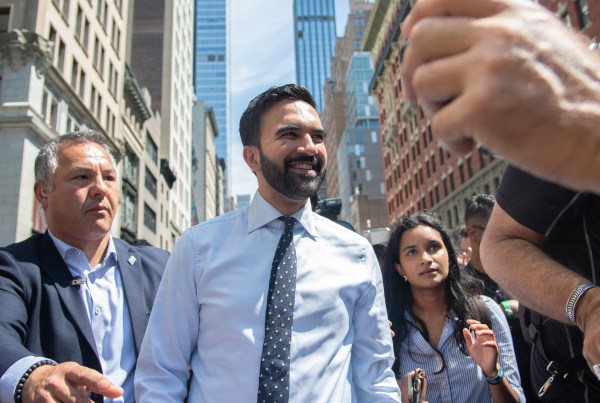
Moderate Democrats Fear the Mamdani Effect
Toeing the Company Line
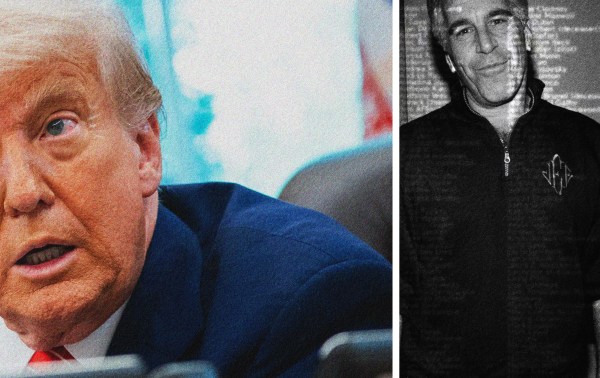

Can Elon Musk Defy the Odds With His ‘America Party’?

Worth Your Time
- Writing for Matthew Yglesias’s newsletter, Slow Boring, Ben Krauss argued that our political system isn’t the only institution run by an increasingly older cohort. Most of our industries are being led by an aging workforce, which is having measurable effects on the upward mobility of younger workers. “Over the past decade, the number of workers over the age of 65 has increased by 33%. That means if you’re eligible to cash a social security check, you’re part of the fastest growing age cohort in the American workforce. Some workers are doing this out of financial necessity, but wealthy workers have also steadily remained in the workforce longer,” Krauss wrote. “The economist Nicola Bianchi looked at 35 years of income survey data from the US and found that the pay gap between workers over 55 and those under 35 increased by 61 percent between 1979 and 2018. His explanation is intuitive: ‘Older workers have accrued more promotions and have been occupying those slots for longer, which means younger workers cannot reach those levels anymore.’ Sixty-one percent is a striking number. But even if it’s only directionally correct, it suggests a serious shift in how opportunity is distributed, with younger workers increasingly locked out of the best-paying roles.”
Presented Without Comment
The Hill: [Agriculture Secretary Brooke] Rollins Suggests Medicaid Recipients Can Replace Deported Farmworkers
Also Presented Without Comment
NBC News: Trump ‘Not Happy With Putin,’ Accuses Russian Leader of Throwing ‘Bulls—’
In the Zeitgeist
James Gunn’s Superman comes out this Thursday, and while we’re all experiencing superhero movie fatigue, critics have been saying that this one is actually good. Our hats are off to the “new DC.”
Let Us Know
How would you rate the second Trump administration’s policy in the Middle East so far?

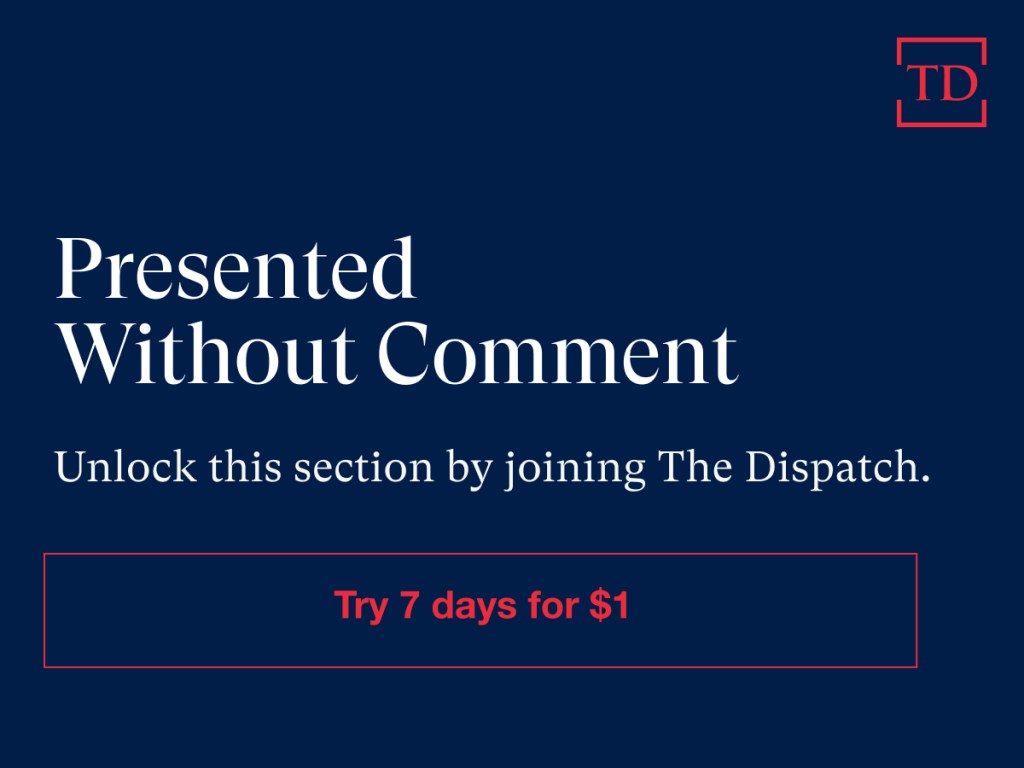






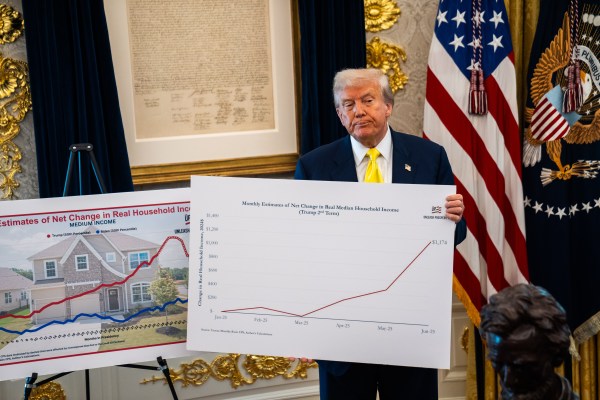
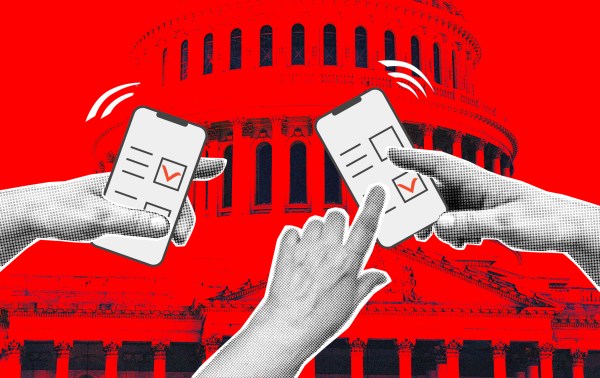


Please note that we at The Dispatch hold ourselves, our work, and our commenters to a higher standard than other places on the internet. We welcome comments that foster genuine debate or discussion—including comments critical of us or our work—but responses that include ad hominem attacks on fellow Dispatch members or are intended to stoke fear and anger may be moderated.
With your membership, you only have the ability to comment on The Morning Dispatch articles. Consider upgrading to join the conversation everywhere.